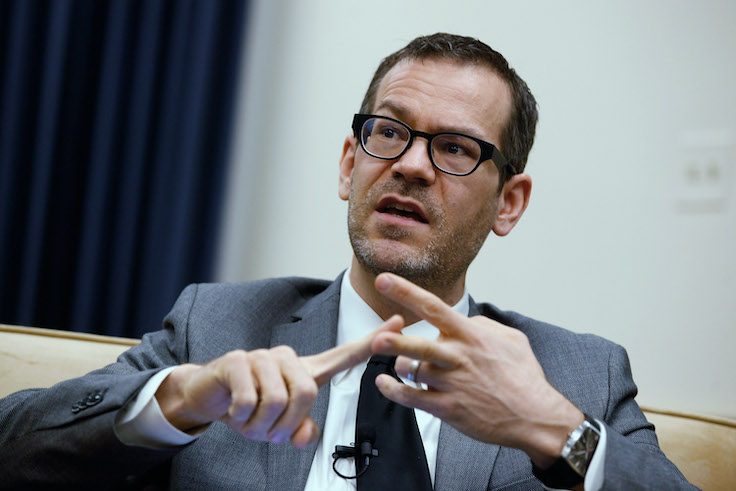Pentagon strategy chief Colin Kahl is in the hot seat over his role in the Biden administration's bungled Afghanistan withdrawal, four months after Senate Republicans unanimously opposed his nomination and warned that his appointment would be disastrous for national defense policy.
Kahl, the civilian head of policy planning at the Department of Defense and third highest ranking department official, has been a key player in planning for the Afghanistan withdrawal and the day-to-day policy decisions on the ground. While several Biden administration officials have been publicly defending the president’s decision to withdraw from Afghanistan, Republican foreign policy leaders say Kahl is the behind-the-scenes player largely responsible for the botched evacuation of Afghanistan and decision to leave Americans stranded in the country. The GOP lawmakers, who also have criticized Secretary of State Antony Blinken and White House national security adviser Jake Sullivan, now say their fears about Kahl's lack of fitness for the role are coming to pass.
Sen. Bill Hagerty (R., Tenn.), a member of the Senate Foreign Relations Committee, told the Washington Free Beacon that Kahl "should never have been nominated by the president or confirmed by the Senate" and should be held responsible for the Biden administration's failures in Afghanistan, including for the hundreds of Americans who have reportedly been left behind. "In Kahl, we have someone not even qualified for a security clearance at the center of President Biden's incompetently planned and disorderly withdrawal from Afghanistan."
Sen. Marco Rubio (R., Fla.), another member of the Senate Foreign Relations Committee, told the Free Beacon that Kahl and Pentagon leadership "are more worried about woke messaging than combat readiness. And the entire White House national security team is being bullied by a band of medieval terrorists. They are overseeing America's decline, and it is an absolute disgrace."
The criticism of Kahl comes as lawmakers are demanding the resignation of Secretary of Defense Lloyd Austin and Joint Chiefs of Staff chairman Mark Milley over the handling of the Afghanistan exit, which led to a Taliban takeover of the country and a chaotic and deadly evacuation effort. While senior State Department and Pentagon officials have come under the microscope in the wake of the Biden administration's evacuation from Afghanistan, Kahl has largely avoided public scrutiny. Leading GOP foreign policy voices and national security establishment insiders, however, say that Kahl was not prepared for a senior Pentagon job and that this lack of preparation contributed to the administration's failure to plan for the Taliban's rise. The Biden administration rammed Kahl's appointment through Congress this year, even in the face of significant Republican opposition. As Afghanistan fell apart in the past several weeks, Kahl's opponents began to lay blame for the crisis on his office, which is tasked with providing day-to-day policy advice to the Pentagon's military leaders.
As undersecretary of defense for policy, Kahl has played a leading role in crafting the withdrawal strategy. During a strategy call last week, military commanders warned Kahl and other Pentagon leaders about an imminent "mass casualty" attack expected to take place near Abbey Gate last week, according to notes from the classified session obtained by Politico. Kahl and the other officials reportedly declined to close the gate due to concerns that it would impede the evacuation process. The next day, a suicide bomber killed 13 service members in the same location.
On the call, Kahl and other officials were also reportedly told that the United States would not be able to evacuate every American from the country, an outcome that the Biden administration had promised to prevent. Kahl expressed concern about the optics, reportedly worrying that "history will judge us by those final images."
Kahl "owns the [Department of Defense's] failure to plan and implement a withdrawal that wouldn't dishonor our veterans, our military, and our values," said Josh Block, a foreign policy scholar at the Hudson Institute and former Clinton administration State Department official.
Block said Kahl is "unqualified for his job, a liability to American national security" and "needs to be removed or made to resign."
Calls for Kahl's resignation come just months after his bruising confirmation battle, during which he faced scrutiny for his Twitter attacks on Republicans, his advocacy for the Iran nuclear deal, and his record of inaccurate foreign policy predictions.
Kahl was confirmed in a divisive, party-line vote after he apologized for his years of inflammatory tweets, including blasting the GOP as the "party of ethnic cleansing" and a "clown show."
Kahl, who served as Biden's national security adviser during the Obama administration, was a top advocate of the nuclear deal with Iran and has spoken at multiple events hosted by the National Iranian American Council, a pro-Iranian regime lobbying group.
He opposed a 2017 bill to sanction the Islamic Revolutionary Guard Corps, the nexus for Iran's global terrorism operations. Kahl also protested the Trump administration's assassination of Iranian terror chief Qassem Soleimani, which he described as "the equivalent of another country taking out the director of the CIA, secretary of defense, and shadow secretary of state all rolled into one."
Sen. Tom Cotton (R., Ark.), in a speech he made this spring in opposition to Kahl's nomination, said the nominee was "wrong about nearly every important foreign policy decision of the last decade."
Cotton noted that Kahl in 2010 dismissed concerns about a rapid withdrawal from Iraq, which he said was "very unlikely to trigger a dramatic uptick in violence"—a prediction that was proven wrong after terrorists seized a large portion of Iraq. Kahl also predicted that recognizing Jerusalem as Israel's capital would prompt a third intifada and that Trump's withdrawal from the Iran nuclear deal and later assassination of Soleimani would spark a war with Tehran.
"Mr. Kahl's inability to accurately assess these events almost defies probability," said Cotton.
